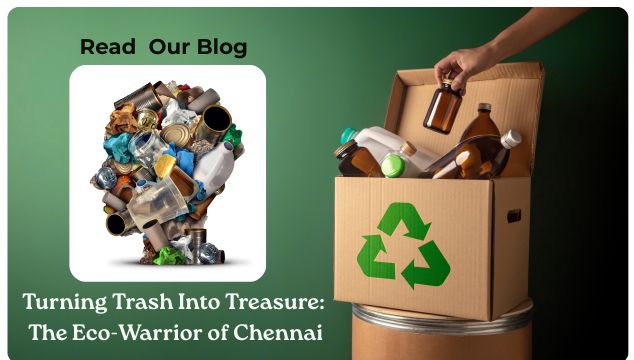In the bustling streets of Chennai, where honking autos and street vendors fill every corner with life, one man quietly started a movement that would go on to transform not just his livelihood, but the mindset of an entire community.
The Beginning
Ramesh was a regular auto driver—early mornings, long hours, and a meagre income that barely kept his family afloat. One evening, stuck in traffic near a clogged drain overflowing with plastic waste, he noticed something strange: birds pecking at plastic wrappers, cows chewing on polybags, and people walking by, indifferent.
That image stayed with him.
He began to wonder—what happens to all this waste? Where does it go? Who takes care of it?
The Turning Point
His curiosity soon turned into concern. With no background in waste management, he began reading articles in Tamil newspapers and watching videos on mobile recycling and upcycling. What started as a side interest soon became a passion.
Ramesh began collecting plastic bottles, wrappers, and discarded household plastic during his daily drives. People mocked him.
"Auto driver turned ragpicker?" they said.
But he kept going.
He stored the waste in a corner of his small house and taught himself how to sort, clean, and separate recyclable plastics. Eventually, he connected with a Chennai-based NGO that trained him in converting plastic waste into useful items like bricks and paver blocks.
A Movement is Born
Ramesh didn’t stop at recycling. He rented a tiny shed and started a micro recycling unit. He hired two jobless youth from his locality and trained them. With time, the unit grew. Today, it processes over 15 tones of plastic waste annually, producing durable building blocks used in low-cost housing projects and school playgrounds.
He now employs 10 young people and runs plastic collection drives in local schools and residential areas. His story was even featured in a regional TV program, earning him the nickname “Plastic Porali” (Plastic Warrior).
Impact Beyond Measure
What Ramesh did goes beyond recycling.
- He:
Created employment for local youth.
- Improved sanitation in nearby slums.
- Changed perceptions, showing that even "waste" can be powerful.
Today, schoolchildren visit his unit on field trips, and local businesses collaborate with him to reduce their plastic footprints.
Message to the World
Ramesh says:
"You don't need a degree to clean your surroundings. You need a conscience. I just started with a pair of gloves and a will to act."
Conclusion
In a world drowning in plastic, Ramesh proved that change can start with one concerned citizen. His story is not just about environmental action—it’s about vision, courage, and the power of persistence.
Remember: The earth doesn’t need a handful of people doing zero-waste perfectly. It needs millions doing it imperfectly—but consistently.
